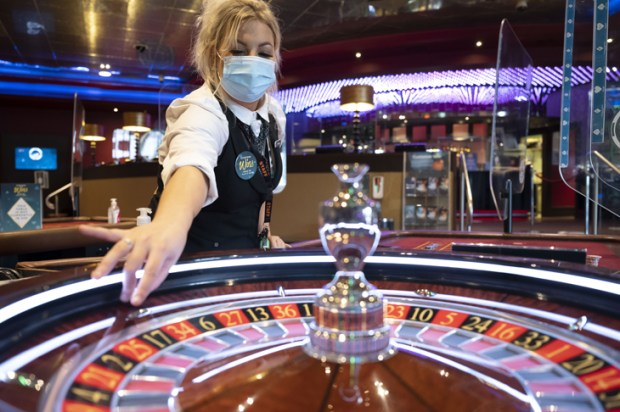With the former British chancellor, Rishi Sunak, openly wondering whether lockdowns were a good idea, when will the Australian political class and mainstream media admit that they were completely wrong, not only on lockdowns, but most other aspects of the response to Covid-19?
And if the elites could be so wrong on that, they should wonder about the government’s obsessive determination to reach 45 per cent CO2 emissions and 82 per cent reliance on ‘renewables’ by 2030, with the likelihood that all new mining projects will be blocked, as I explained last week. They must know that similar policies in the EU and UK are leading to a likely disaster in the European winter. They must also know the government can neither reduce the temperature nor the incidence of ‘drought and flooding rains’, a permanent feature of this ‘sunburnt country’. Governments could of course significantly mitigate the effect of these by clearing fuel from the forest floors while reversing the bans on nuclear power and the building of significant dams. In comparing our political class with the European, the Europeans were at least not so foolish as to blow up their suspended coal-fired power stations.
There is one beneficiary of this obsession – Beijing. Not only do they produce most renewable infrastructure, they must also be gratified by the way Western governments, including ours, seem so intent on weakening the West.
This is not so surprising with the current White House incumbent given the way in which he is so compromised by his family’s dealings with Beijing. But why are so many Australian politicians and media determined to do something which will have zero effect on the climate and only benefit Beijing?
Returning to pandemic mismanagement, we must never forget our natural defence which will always militate against a pandemic, just as it did against the imperial Japanese. This is the defence of being a remote island nation. Nor should we fall for the claim that as a result of the lockdowns we did better than most. Just compare the deaths per million from the virus in Australia with such countries as Japan or Taiwan.
It was obvious, even in early 2020, that the best response was to look after the vulnerable and let everybody else get on with their lives. There should have, of course, also been some advice on prudent behaviour. This would include washing hands and discouraging uncovered sneezing and coughing in public.
While the mainstream media could not resist attacking President Trump for being, as leading commentators in the Australian claimed, ‘missing in action’ or ‘mishandling the crisis’, the President was working on a public-private project to secure the early production of necessarily minimally tested vaccines. This was never to make them mandatory or to engage in an obviously risky mass vaccination of children, but to make them available to the vulnerable. Earlier he had been the first to limit international travel when Beijing was hiding the fact that the returning vast numbers from the Chinese New Year celebrations would unknowingly spread the virus around the world.
It was obvious at the time that one of the few things government did that was correct was to close our international (and not state) borders. But even then, they did this for far too long. Also, the execution of the policy was poor and not only in relation to the Ruby Princess.
Coming back to Australia from South America in late February 2020, I was surprised my temperature was not tested to guard against infecting others. But then governments went overboard, supported by the mainstream media. When a Sydney newspaper published a photograph of surfers on Bondi Beach suggesting people were closer than they actually were, this unleashed a disapproving commentariat, most of whom must have never been on an Australian beach. Bondi and other beaches were closed, with police and other officials everywhere. Then came the lockdowns, with Victoria enduring the world’s longest. Notwithstanding the wide powers of the federal government, the Morrison government accepted without dissent an exclusive power in the states to impose lockdowns. They even provided the funding backup for this which resulted in a massive debt to be repaid by the next generation.
To counter the absence of these points in the mainstream media, sixteen of my pieces appeared in The Spectator Australia in 2020. In addition, my colleague Rebecca Weisser was to write about important information not readily available on the vaccines and on certain proscribed early but effective treatments.
One curious aspect of the response was that the wise advice of former health minister Tony Abbott recorded in his internationally lauded plan for dealing with pandemics was ignored by governments. Another was the origin of the virus. The government was rightly concerned about this, but as I warned before they acted, unwise to go to the Beijing-influenced World Health Organisation. Rather they should have proposed to President Trump the setting up of an international tribunal to inquire and if appropriate, award compensation. That Beijing would have refused to appear would not have stopped the determination of the issues, and I believe, the recovery of any damages from assets under Beijing’s control here.
That of course would have meant more trade retaliation, but that may well be coming anyway.
Asked recently by a government advisor whether a royal commission on the pandemic response was appropriate, I said, ‘That all depends on whom you appoint.’ This is far more important than a second, superfluous Morrison inquiry. In my view, they should appoint urgently three or four royal commissioners of such calibre that the nation will have confidence in them.
Got something to add? Join the discussion and comment below.
You might disagree with half of it, but you’ll enjoy reading all of it. Try your first month for free, then just $2 a week for the remainder of your first year.













